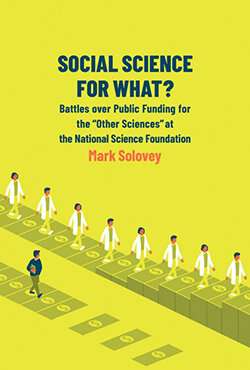[ad_1]

Early in the Chilly War era, “social sciences had been criticized for not getting seriously scientific—for currently being ideological and political in techniques that may possibly appear to have been disguised as science,” states Mark Solovey, a professor in the Institute for the Heritage & Philosophy of Science & Technology at the College of Toronto.
“[At the time], there was animosity in the U.S. in direction of socialism and communism. This brought about a large amount of troubles for social experts and their supporters, who argued for a science of society which was independent from ideology and politics.”
Social researchers have been also pressed about the social relevance of their do the job about difficulties these types of as racism, money inequality, and crime, and threats to democracy, Solovey adds.
Solovey’s latest ebook, “Social Science for What?: Battles Around Community Funding for the ‘Other Sciences’ at the Countrywide Science Basis,” explores the historical distrust of social science, which he claims proceeds to this day. He argues that when it comes to funding for academically oriented exploration, American social researchers have been much more dependent on the U.S. Countrywide Science Foundation than their counterparts in organic science—the latter also locate potent aid from other science patrons. Yet, at the NSF the social sciences have had to contend with much less respect over a lot of decades because of to critical attitudes toward the subject.
Solovey has extended studied the progress of the social sciences in the U.S. In the situation of the NSF, he states, help has generally been hampered by “scientism,” the notion that purely natural science, governed by immutable legislation and grounded in arduous methods of inquiry, existed on a much more elevated plane that the social sciences desired to emulate.
Like normal scientists, social scientists are worried with evidence-dependent research and use both equally quantitative and qualitative applications to arrive at conclusions. But they are uniquely worried with human society and social associations, which are entangled with normative judgments and morality.
“When the NSF was established, its founders experienced to determine: Is there these a point as a social science and, if so, how would we know if we see it?” Solovey claims. “Sure regions of research have been institutionalized, these as sociology, economics, anthropology, political science. Psychology has locations that are additional social, other individuals that are more biological. There have generally been boundary disputes.”
Social science funding has only ever represented a small proportion of the NSF’s spending plan. “In the late 1950s social sciences represented possibly two % of the complete,” claims Solovey. “Then arrived the 1960s, which was a unique period in U.S. modern society.”
At that stage, social science entered a form of golden age due to its affiliation with daring policy initiatives introduced in the course of the presidencies of John. F. Kennedy and Lyndon B. Johnson. Researchers served to boost federal applications to tackle a broad array of complications, like, as Solovey writes, “juvenile delinquency, urban blight, racial conflict, poverty and unemployment.” By the late 1960s, the NSF allotted all-around seven p.c of its spending budget to social science—”the maximum it is at any time arrived at,” Solovey says.
But in the 1970s, the pendulum swung again towards conservative mistrust. Liberals also expressed distrust of some social science investigation, in particular that which they saw as serving conservative economic or political ideals, practices and policies.
Solovey’s e-book requires audience to the conclusion of the Reagan presidency and, in a small remaining chapter, up to the present working day, leaving questions about the foreseeable future of social science support in the U.S.
His guide proposes a new funding agency for the social sciences in the U.S.: a Nationwide Social Science Basis, which would request to assistance social investigation on a broad front by welcoming and promoting operate grounded in humanistic as effectively as scientific approaches—perhaps together the lines of Canada’s Social Sciences and Humanities Research Council.
“This proposal currently arrived up in the late 1960s when there was a reasonable bit of curiosity,” Solovey suggests. “For me, it is the most exciting episode in the whole tale: there was a proposal in Congress, there ended up nationwide hearings, the Senate voted to support it. But it never got assistance in the Home of Representatives. And, by the late 1960s, the weather had transformed and the total notion disappeared. Given that then, this concept has in essence vanished.”
In their investigations of employment tendencies, poverty, political actions, human sexuality and so quite a few other domains, Solovey notes that social scientists keep on to count on resources of general public and personal guidance. The contributions that they can make to culture are all the more vital in moments of worldwide disease, war, and local climate transform.
“I would extremely a great deal like American social experts and folks fascinated in the difficulty of funding to help a proposal for a Nationwide Social Science Foundation.”
Quotation:
Hampered by ‘scientism?’ Researcher examines the historical past of American social science (2022, April 13)
retrieved 21 April 2022
from https://phys.org/information/2022-04-hampered-scientism-historical past-american-social.html
This document is issue to copyright. Apart from any reasonable dealing for the intent of personal examine or investigate, no
element may well be reproduced with no the written permission. The written content is offered for data functions only.
[ad_2]
Source website link




More Stories
Cultivating Skills All Students Need to Thrive  – Dr. Catlin Tucker
Gagliano tapped as Newberry College’s interim dean of arts, humanities & social sciences
Developing Psychological Citizens with Dr. Fathali Moghaddam